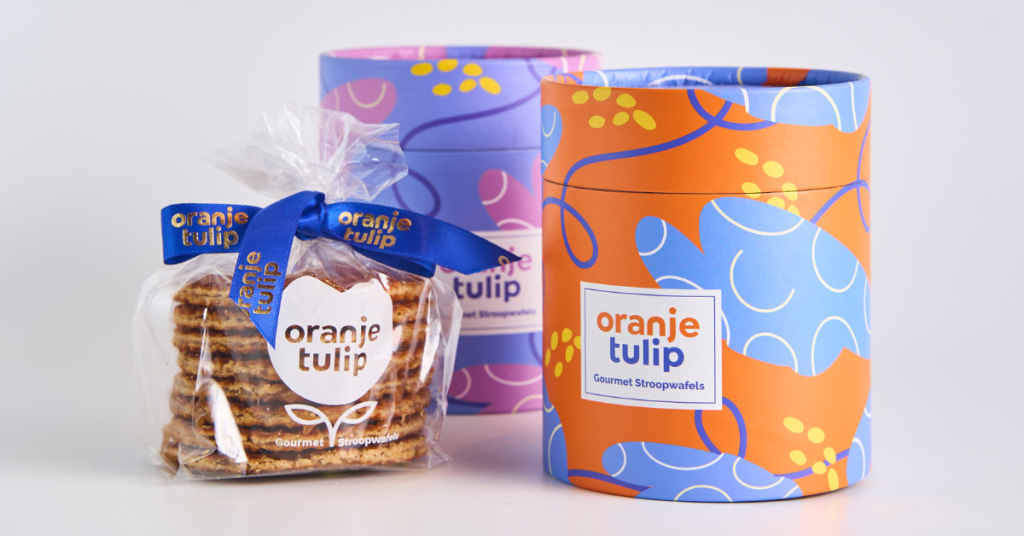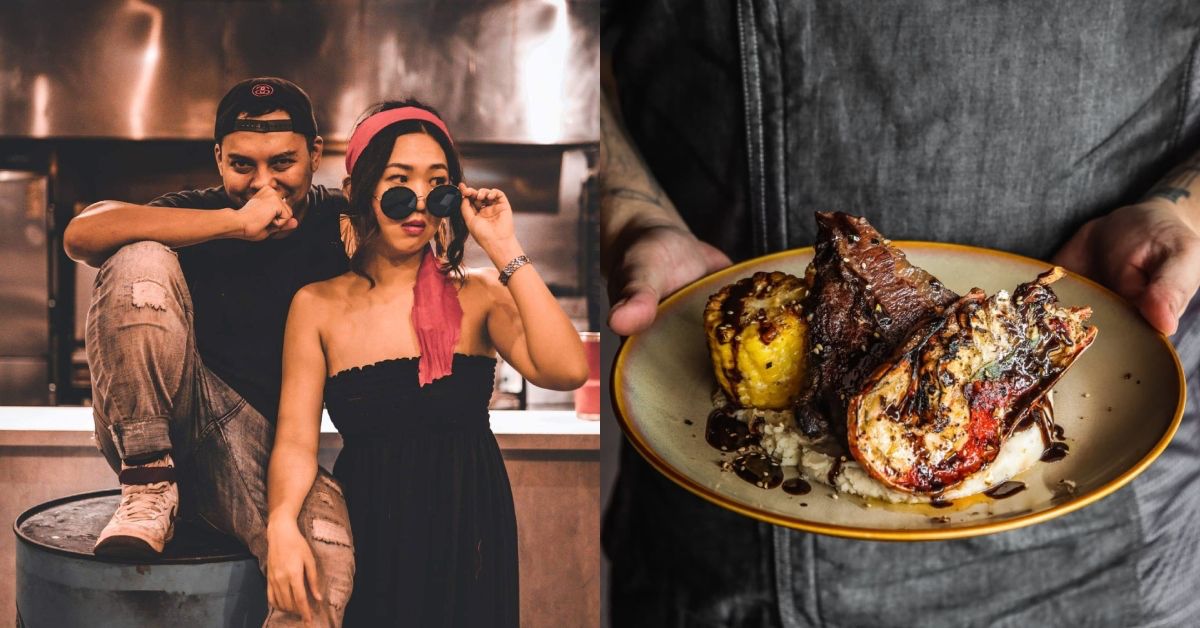Obsessed with the Dutch treat, this M’sian spent RM350K to start a stroopwafel cafe in SS15
Oranje Tulip is a new cafe in SS15 that serves freshly made stroopwafels, a kind of Dutch cookie. It also sells ready-to-eat souvenirs.

Working in the property industry, 36-year-old Ray Lim enjoyed his first stroopwafel many years ago when a family friend brought a pack back from their trip to Amsterdam.
Featuring a balance of gooeyness and a soft snap, as well as a mix of buttery vanilla flavours complemented by a touch of cinnamon, what’s not to love about the treat?
 Image Credit: Oranje Tulip
Image Credit: Oranje TulipDescribing it as “easily one of the yummiest cookies” he’s ever had, Ray said the treat was particularly memorable since he could only enjoy it rarely.
Last year, another friend had brought back some stroopwafels from Amsterdam, and as always, he had thoroughly enjoyed it. But this time, he had an epiphany. “It made me wonder: Why aren’t there more people selling them when they’re this tasty?”
After searching around, he managed to buy a pack of the Dutch cookies from a local grocer. It was decent, he said, but just didn’t have the depth and the fresh taste he craved.
This then made him wonder: What do the best stroopwafels taste like?
That thought inspired Ray to take a trip to Amsterdam, where he ended up trying “too many stroopwafels”. He eventually crowned a favourite, though, which was from Rudy’s Original Stroopwafels at Albert Cuyp Markt.
 Image Credit: Oranje Tulip
Image Credit: Oranje TulipFrom there, Ray found a stroopwafel master, from whom he learnt how to make traditional stroopwafels.
Believing in his dream of bringing these delicious Dutch treats to Malaysia, the founder put in upwards of RM350k to start Oranje Tulip.
Bringing fresh stroopwafel culture to Malaysia
A specialty snack store tucked in SS15, Oranje Tulip offers fresh, handmade stroopwafels that come with or without toppings. Each one is made fresh for guests to enjoy in-store or on the go.
For those curious about the name “Oranje Tulip”, it actually honours stroopwafel’s Dutch origins. Oranje means orange, of course, except it’s pronounced “oh-run-yer”. The colour was chosen as it’s the national colour of the Netherlands.
 Image Credit: Oranje Tulip
Image Credit: Oranje TulipSubsequently, tulip was chosen as it’s the most well-known flower associated with the country. It also expresses positive qualities like grace and beauty.
“We actually sell fresh stroopwafels the traditional Dutch way: A large, warm stroopwafel made right in front of you, perhaps in a bustling street market if you’re in the Netherlands,” Ray shared.
The founder agreed that ready-made stroopwafels may be yummy as is or when heated over a cup of coffee, but nothing beats enjoying a freshly made one.
 Image Credit: Oranje Tulip
Image Credit: Oranje Tulip“We’re very happy to be the first to offer that in Malaysia,” he added.
Not forgetting that stroopwafels are often enjoyed as a home snack and souvenir, Oranje Tulip also has ready-packed stroopwafels that can be enjoyed at home or given as gifts.
Aside from stroopwafels, the spot also offers beverages such as coffee, tea, and ice or hot chocolate. These are concocted to pair exceptionally well with stroopwafels, Ray said.
Prior to Oranje Tulip, Ray used to run a restaurant in PJ many years ago. He revealed that he does have other business interests at the moment, but Oranje Tulip is his top priority.
 Image Credit: Oranje Tulip
Image Credit: Oranje TulipHe expressed, “It’s a labour of pure love!”
Although stroopwafels are still relatively unknown in Malaysia, Ray believes that when it comes to F&B, great flavour trumps all. “My confidence stems from my belief in offering a genuinely delicious product, and of course its novelty factor may just be to my advantage.”
“Something genuinely yummy will be yummy everywhere else in the world.”
Balancing authenticity and localised flavours
To really showcase how delicious stroopwafel is, Ray seeks to use only high-quality, fresh, and real ingredients with no preservatives.
The dough alone took the team more than 100 tries and a couple of months to get right, Ray said. But it was a needed process.
“If we wanted to introduce a new product to the market that can be accepted en masse, we needed it to be genuinely enjoyable,” he pointed out.
 Image Credit: Oranje Tulip
Image Credit: Oranje TulipAs much as possible, Oranje Tulip tries to do everything in-house, from toasting their own nuts to making their own chocolate ganache.
The process of making their stroopwafels involve mixing a cookie dough, then using a special hot waffle press.
Contrary to common belief, Ray shared, stroopwafels aren’t made by sandwiching two individual cookies together, but rather slicing a single thin cookie while warm. From there, the ‘stroop’ (the caramel-like syrup) is applied, then two sides are pressed back together.
“Every piece of stroopwafel has to be done this way, both for tradition and for the perfect thickness and texture,” Ray said.
The basic recipe for the stroopwafel was taught to Ray by his mentor, but the Oranje Tulip team faced difficulties in terms of raw ingredients. Not everything that’s used in Europe is easily available in Malaysia.
 Image Credit: Oranje Tulip
Image Credit: Oranje TulipAnd there’s the matter of taste, too. Ray pointed out that many Southeast Asians typically use cinnamon for savoury cooking, such as Nasi Biryani and Daging Kicap Manis.
As such, he decided to pull back ever so slightly on the cinnamon profile in their stroopwafels, while bringing out the butter and vanilla flavours.
“We even developed a very yummy salted caramel filling as an alternative, which doesn’t contain any cinnamon,” Ray said. “That allows our customers to choose when they order a fresh one.”
Pressing forward
The fact of the matter is that stroopwafels are still quite new to Malaysians, so awareness is sorely needed.
It was challenging starting out, the founder admitted. Many did not bother checking out the store, so they decided to give out free samples to get people’s attention. The business is also putting effort into growing a social media presence.
 Image Credit: Oranje Tulip
Image Credit: Oranje Tulip“I believe if something is enjoyed and talked about enough (e.g. dalgona coffee), then it will eventually become mainstream,” Ray said.
Moving forward, he has hopes to open more branches, perhaps in popular malls throughout the Klang Valley. Ray is also looking into the potential of franchising, but only when Oranje Tulip reaches a point of stability.
“On top of that, we do have a few exciting new food products in the pipeline, which will be rolled out gradually,” Ray revealed. “But we will always maintain stroopwafels as our core product.”
Learn more about Oranje Tulip here. Read other articles we’ve written about F&B businesses here.Featured Image Credit: Oranje Tulip

 UsenB
UsenB 































